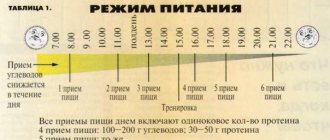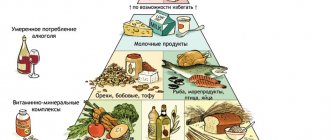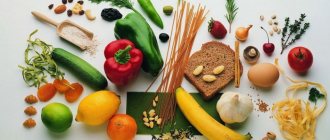Food researchers often strive to find out which food components are essential and essential for consumption, and what the human body needs for them - after all, health, length and quality of life directly depend on this. It is noteworthy that these biologically essential substances - nutrients (from Late Latin nutrio - “nutrition”) - cannot be produced by the body, but come from the outside, so the need for them remains throughout life.
What are micronutrients?
Micronutrients are a broad term that refers to various vitamins and minerals. They are required by the body in much smaller quantities than macronutrients (protein, fats and carbohydrates), but are essential for maintaining many body functions. Some micronutrients, for example, vitamin D, are synthesized in our body if the synthesis processes are not disrupted. The rest can be obtained from food.
What do micronutrients do?
Vitamins and minerals are involved in a wide variety of body processes, including:
- Turning genes on/off
- Converting nutrients into energy
- Creation of new fabrics
- Restoring the body from damage caused by free radicals.
- Support of organs and systems
Vitamins
There are two types of vitamins: water-soluble and fat-soluble.
Water-soluble vitamins
As you might have guessed, water-soluble vitamins are those vitamins that dissolve in water and are excreted through urine.
These include vitamins such as:
- Thiamine
- Riboflavin
- A nicotinic acid
- B6
- B12
- Folic acid
- Pantothenic acid
- Kholin
- Vitamin C
- Biotin
Fat-soluble vitamins
Fat-soluble vitamins dissolve in fat and are stored in the liver. May be toxic if in excess.
These include:
- Vitamin A
- Vitamin B
- Vitamin E
- Vitamin K
Notes
- ↑ 123456
Rebrov V.G., Gromova O.A. Vitamins, macro- and microelements. M.: GEOTAR-Media, 2008. 960 p. - ↑ 123
Mashkovsky M.D. Medicines. A manual for doctors. M.: New wave, 2000 - Drozdov V.N., Noskova K.K., Petrakov A.V. Efficiency of iron absorption when taken separately and simultaneously with calcium // Therapist. 2007. No. 9. pp. 47–51.
- Herbert V., Drivas G., Foscaldi R., Manussellis C., Colman N., Kanazawa S., Das K., Gelernt M., Herzlich B., Jennings J. Multivitamin/mineral food supplements containing vitamin B12 may also contain analogues of vitamin B12. N Engl J Med. July 1982; 22; 307(4):255–6.
- Dijkhuizen MA, Wieringa FT, West CE, Martuti S., Muhilal. Effects of iron and zinc supplementation in Indonesian infants on micronutrient status and growth. J Nutr. 2001; 131:2860–5.
- Shrimpton DH Micronutrient interactions. J Chemist & Druggist 2004; 15 May.
- ↑ 1234
Shikh E.V., Ilyenko L.I. Clinical and pharmacological aspects of the use of vitamin-mineral complexes in pediatrics: Textbook. M.: Medpraktika-M, 2008. - Rossander-Hulten L., Brune M., Sandstrom B., Lönnerdal B., Hallberg L. Competitive inhibition of iron absorption by manganese and zinc in humans. American Journal of Clinical Nutrition 1991; 54: 152–6.
- ↑ 123
Serebrova S.Yu. Interaction of micronutrients during the absorption of components of vitamin-mineral complexes // Doctor. 2010. No. 3. - Tutelyan V.A., Spirichev V.B., Sukhanov B.P., Kudasheva V.A. Micronutrients in the diet of a healthy and sick person. M.: Kolos, 2002.
Minerals
Minerals are divided into two categories: macrominerals and trace elements. The human body needs the former much more than the latter. Minerals such as sodium and potassium are also electrolytes and are vital for both nerve and muscle function and fluid balance in the body.
Macrominerals:
- Sodium
- Potassium
- Chlorine
- Calcium
- Phosphorus
- Magnesium
Trace elements:
- Chromium
- Copper
- Fluorine
- Iodine
- Iron
- Manganese
- Molybdenum
- Selenium
- Zinc
Nutrition components: carbohydrates
Carbohydrates are the largest nutritional component by weight. They can be complex and simple, digestible and indigestible. The main source of carbohydrates is plant products.
Digestible carbohydrates are an important energy resource for the body; they are burned 100% without forming waste.
The average daily intake of carbohydrates ranges from 350 to 500 g, it is determined by the type of activity and energy costs. The minimum dose is considered to be 50–60 g, a further reduction of which leads to metabolic disorders. Excess carbohydrates provokes the development of obesity, diabetes, atherosclerosis and other diseases.
The best option among foods containing carbohydrates are natural, unprocessed vegetables, fruits and berries.
What micronutrients should you pay attention to first?
A difficult question, the answer to which will depend on your age, gender, activity level, food preferences, medications prescribed to you, and so on. Many micronutrients can be obtained simply by eating a nutritious diet.
Either way, here are a few micronutrients that people are often deficient in:
Kholin
Choline is important for mental performance, fat metabolism and cellular integrity. Research suggests that most people are deficient in choline, which in turn negatively affects the liver, heart and nervous system.
Sources: Beef, eggs, soybeans, chicken, fish, mushrooms, potatoes and wheat germ.
Vitamin D
Vitamin D improves the absorption of calcium in the intestines and is also important for bone health and immunity. Vitamin D is difficult to obtain from food, but can be synthesized in the body with adequate access to sunlight and cholesterol. The problem is that most of us do not receive enough sunlight to synthesize the required amount of vitamin D, especially in winter. As a result, many people are unaware of their vitamin D deficiency.
Dietary sources: fish oil, salmon, sardine, egg yolk, dairy products fortified with vitamin D.
Calcium
Calcium is widely known for its role in strengthening the skeletal system, but that's not its only benefit. It is also important for heart and muscle function. People have recently often excluded dairy products from their diet, replacing them with plant-based analogues. For this reason, many people lack calcium.
Sources: Milk, yogurt, cheese, calcium-fortified plant-based dairy analogs, sardines, cauliflower, bok choy.
Nutrition components: water
Water is a “solvent” that regulates all functions in the body, making up 65–75% of the total mass. The daily water requirement for adults is defined as 40 ml per 1 kg of weight - from 2.3 to 2.7 liters. With food and as a result of the creation of water during metabolism, the body receives from 0.9 to 1.2 liters, the residual volume ranges from 1 to 1.5 liters. The best mode of water consumption is to take it evenly throughout the day within the required minimum - 6 - 8 glasses, observing a certain order. It is the lack of water in the body that often provokes premature aging, since chronic dehydration is the primary source of most pathologies. Many people believe that drinks such as tea, coffee, alcohol, and soda can satisfy the body's need for water. They make a serious mistake, since the drinks contain dehydrating substances, they not only remove the water they are in, but affect the water reserves in the body. Water is the cheapest medicine for a dehydrated body.
Micronutrients and vegetarianism
Are you thinking about giving up meat or have you already switched to a plant-based diet? Veganism and vegetarianism do not deprive you of the opportunity to get all the necessary micronutrients, but you need to pay attention to those micronutrients that are most easily obtained through animal products:
Vitamin B12
Vitamin B12 can only be found in animal products. Vegans and vegetarians should consume plant-based foods fortified with the vitamin (cereals, nutritional yeast, etc.) or purchase them in supplement form. B12 is important for many processes in the body and its deficiency can lead to damage to the nervous system, problems with mood and behavior, dizziness, and more.
Iron
You can get iron from legumes, spinach and tofu, but iron from plant sources is less absorbable than from animal sources. Vegetarians and vegans should include iron-rich plants in their daily diet and combine them with foods rich in vitamin C to improve iron absorption. Iron deficiency anemia can seriously affect a person's energy levels and immunity
Zinc
Zinc can be found in a variety of plant foods, such as legumes and nuts. But, like iron, plant zinc is absorbed worse by the human body than animal zinc. Zinc is a catalyst for many enzymes and is involved in immune support, wound healing and cell division. Vegetarians and vegans should consume zinc-rich plants as often as possible.
Calcium
Dairy products are a rich source of calcium, which is also easily digestible, so giving up milk can result in a serious deficiency of the mineral. Dairy-free vegetarians and vegans should include a variety of calcium-rich foods in their diet. These include: cauliflower, vitamin-fortified cereals, vitamin-fortified plant milk, calcium-fortified tofu, broccoli and bok choy. A lack of calcium can lead to brittle bones, especially in adulthood.
Sodium
The situation with sodium is a little different, but it is also worth mentioning. Sodium is physiologically essential for the human body, but most people get it in excess. Eating too much salt is linked to high blood pressure, heart disease, brittle bones and kidney stones - and most of us would benefit from reducing the amount in our diets.
Nutrition components: minerals
Minerals are essential elements, the deficiency or excess of which immediately provokes the development of diseases. The functions of mineral substances in the body include plastic function, participation in metabolic and enzymatic processes, effects on the hematopoietic system and immune system, and maintenance of acid-base balance. A deficiency of minerals can cause the development of serious diseases: deterioration of the immune system; diseases of the skin, nails, hair; allergies; diabetes and obesity; hypertension; blood pathologies; scoliosis, osteochondrosis, osteoporosis and many others. Moreover, the human body has a better adaptation to excess (more subtle methods and balancing mechanisms) than to a lack of mineral elements. Deficiency first provokes a redistribution of reserves, later development of diseases and early aging. It is the lack of minerals that is the main mechanism of aging of the body and the main cause of death.
How to increase your micronutrient intake?
Eat a variety of vegetables
Make sure each meal you eat contains three different vegetables. Make a list of vegetables that you should eat every day and which you should eat at least once a week. Pay attention to the season and availability of vegetables.
Rule of Four
Combine fruits, vegetables, whole grain carbohydrates, proteins and vegetable fats at every meal. Diverse foods, varied nutrients!
Constantly update your menu
Add new foods to your diet every week. Eat both raw and processed foods. Some substances are lost during the cooking process, while others are only enhanced by their concentrate. A varied diet is the best way to get enough micronutrients
Choose natural products over additives
Some dietary supplements contain too high a dose of micronutrients, which increases the risk of poisoning. First of all, try to get all the necessary substances from food, consider nutritional supplements only when necessary.











